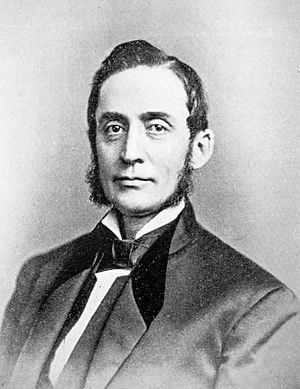Jonathan Chace facts for kids
Quick facts for kids
Jonathan Chace
|
|
|---|---|
 |
|
| United States Senator from Rhode Island |
|
| In office January 20, 1885 – April 9, 1889 |
|
| Preceded by | William P. Sheffield |
| Succeeded by | Nathan F. Dixon, III |
| Member of the U.S. House of Representatives from Rhode Island's 2nd district |
|
| In office March 4, 1881 – January 26, 1885 |
|
| Preceded by | Latimer Whipple Ballou |
| Succeeded by | Nathan F. Dixon, III |
| Member of the Rhode Island Senate | |
| In office 1876-1877 |
|
| Personal details | |
| Born | July 22, 1829 Fall River, Massachusetts |
| Died | June 30, 1917 (aged 87) Providence, Rhode Island |
| Resting place | North Burial Ground |
| Nationality | American |
| Political party | Republican |
Jonathan Chace (July 22, 1829 – June 30, 1917) was an important politician from Rhode Island. He served in both the United States House of Representatives and the United States Senate.
Contents
Early Life and Family
Jonathan Chace was born in Fall River, Massachusetts. His father was Harvey Chace, and his grandfather was Oliver Chace. In 1854, he married Jane C. Moon. They had three children together.
Jonathan Chace was also the nephew of Elizabeth Buffum Chace. She was a famous person who worked to end slavery. Jonathan Chace himself helped people escape slavery through the Underground Railroad. He did this while he was running a dry goods store in Philadelphia.
Education and Business Career
Chace went to public schools and the Friends' School in Providence, Rhode Island. Later, he moved to Central Falls, Rhode Island. There, he worked in cotton manufacturing. This means he was involved in making cotton products. He also became the president of the Phoenix National Bank in Providence. He had interests in several other manufacturing businesses too.
Political Journey
Jonathan Chace began his political career in Rhode Island.
Serving in the Rhode Island Senate
From 1876 to 1877, Chace was a member of the Rhode Island Senate. This is a part of the state government that makes laws for Rhode Island.
Representing Rhode Island in Congress
Chace was a member of the Republican Party. He was elected to the U.S. House of Representatives. He served from March 4, 1881, until January 26, 1885. He then resigned from this position.
Becoming a U.S. Senator
After leaving the House, Chace was elected to the United States Senate. He filled a spot that became open when Senator Henry B. Anthony passed away. Chace started his Senate term on January 20, 1885. He was reelected in 1888. He served until April 9, 1889, when he resigned from the Senate.
Key Work in the Senate
While in the Senate, Chace led the Committee on Civil Service and Retrenchment. This committee worked on improving government jobs and reducing spending. He also supported a bill that helped create the International Copyright Act of 1891. This act is sometimes called the Chace Act. It helped protect the rights of authors and artists for their creative works.
Later Life and Legacy
Jonathan Chace passed away in Providence in 1917. He was buried in the North Burial Ground. He is remembered for his work in both state and national politics. He also played a role in the fight against slavery.
See also
 | Jewel Prestage |
 | Ella Baker |
 | Fannie Lou Hamer |

